Engineering Management: Technology Forecasting and Strategic Planning
VerifiedAdded on 2023/06/10
|5
|886
|244
Report
AI Summary
This report delves into the topic of "Exploring Technology Forecasting and its Implications for Strategic Technology Planning," examining how technology forecasting serves as a crucial tool for understanding the impacts of technological changes, including their significance, timing, and functional capacity. The report aims to equip readers with knowledge regarding the implementation of emerging technologies in organizations, contributing to strategic technology planning. The methodology encompasses both qualitative and quantitative methods, including normative and exploratory forecasting. Normative forecasting involves network techniques, cross-impact analysis, and dynamic modeling, while exploratory forecasting includes analytical methods and the Delphi method. The report references various sources to support its findings, providing a comprehensive overview of technology forecasting techniques and their application in engineering management.
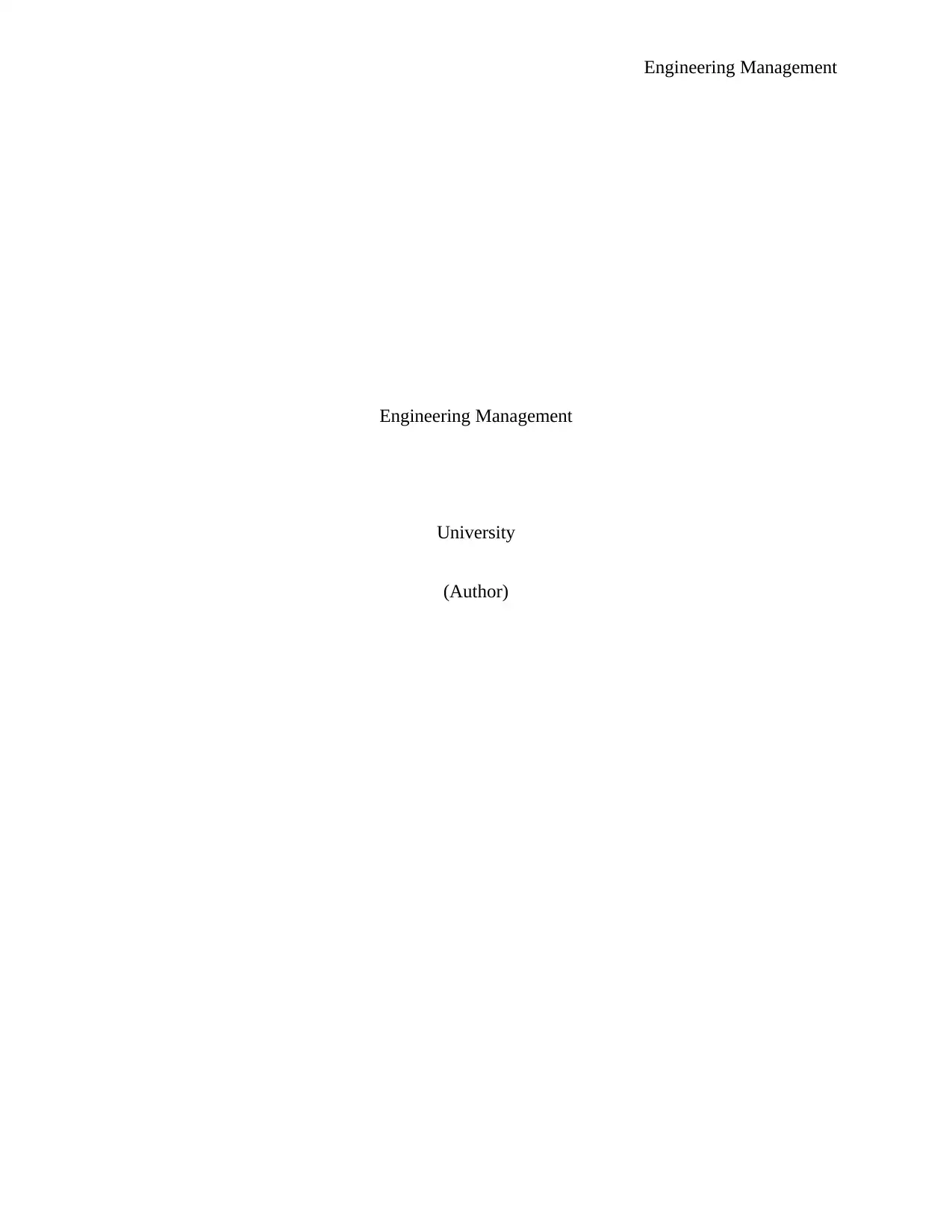
Engineering Management
Engineering Management
University
(Author)
Engineering Management
University
(Author)
Paraphrase This Document
Need a fresh take? Get an instant paraphrase of this document with our AI Paraphraser
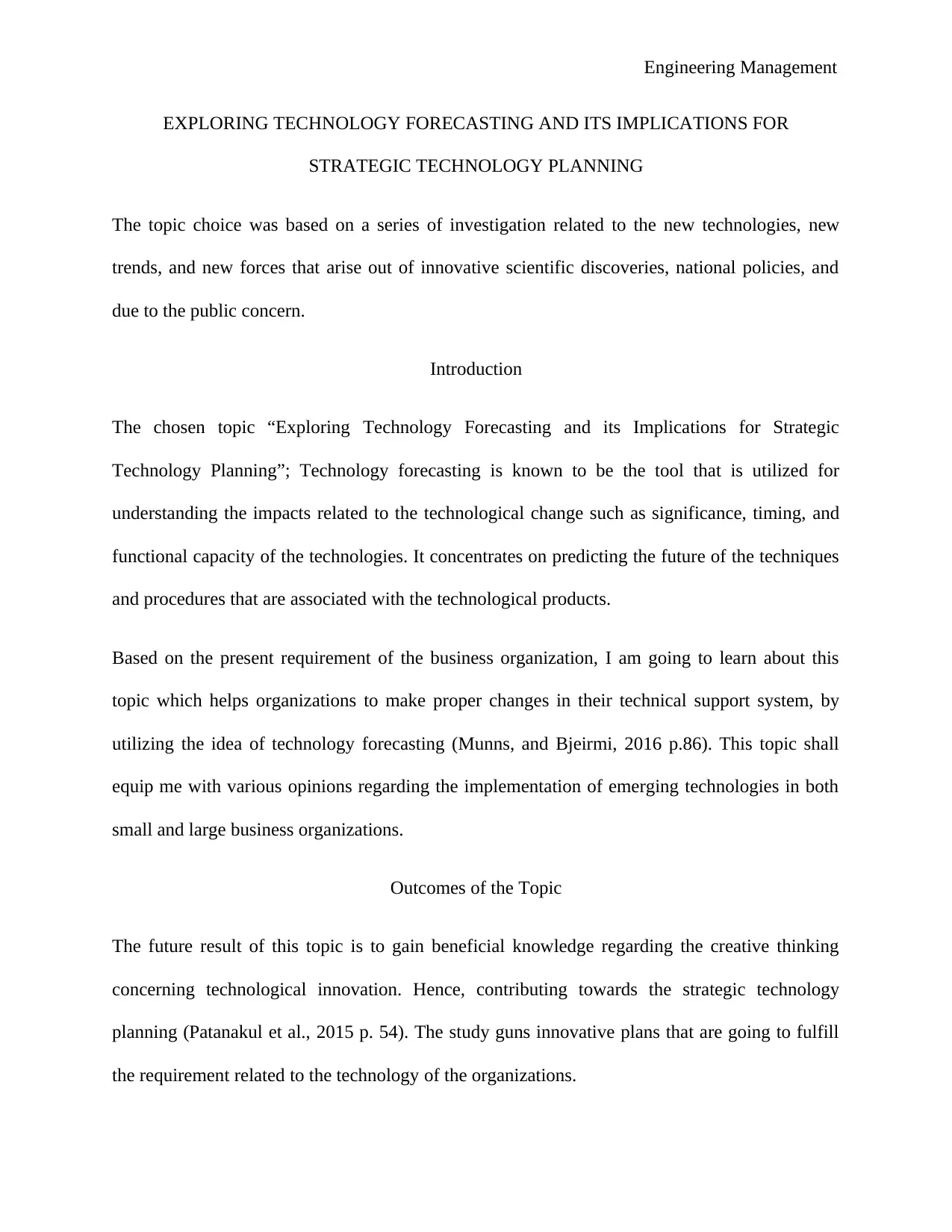
Engineering Management
EXPLORING TECHNOLOGY FORECASTING AND ITS IMPLICATIONS FOR
STRATEGIC TECHNOLOGY PLANNING
The topic choice was based on a series of investigation related to the new technologies, new
trends, and new forces that arise out of innovative scientific discoveries, national policies, and
due to the public concern.
Introduction
The chosen topic “Exploring Technology Forecasting and its Implications for Strategic
Technology Planning”; Technology forecasting is known to be the tool that is utilized for
understanding the impacts related to the technological change such as significance, timing, and
functional capacity of the technologies. It concentrates on predicting the future of the techniques
and procedures that are associated with the technological products.
Based on the present requirement of the business organization, I am going to learn about this
topic which helps organizations to make proper changes in their technical support system, by
utilizing the idea of technology forecasting (Munns, and Bjeirmi, 2016 p.86). This topic shall
equip me with various opinions regarding the implementation of emerging technologies in both
small and large business organizations.
Outcomes of the Topic
The future result of this topic is to gain beneficial knowledge regarding the creative thinking
concerning technological innovation. Hence, contributing towards the strategic technology
planning (Patanakul et al., 2015 p. 54). The study guns innovative plans that are going to fulfill
the requirement related to the technology of the organizations.
EXPLORING TECHNOLOGY FORECASTING AND ITS IMPLICATIONS FOR
STRATEGIC TECHNOLOGY PLANNING
The topic choice was based on a series of investigation related to the new technologies, new
trends, and new forces that arise out of innovative scientific discoveries, national policies, and
due to the public concern.
Introduction
The chosen topic “Exploring Technology Forecasting and its Implications for Strategic
Technology Planning”; Technology forecasting is known to be the tool that is utilized for
understanding the impacts related to the technological change such as significance, timing, and
functional capacity of the technologies. It concentrates on predicting the future of the techniques
and procedures that are associated with the technological products.
Based on the present requirement of the business organization, I am going to learn about this
topic which helps organizations to make proper changes in their technical support system, by
utilizing the idea of technology forecasting (Munns, and Bjeirmi, 2016 p.86). This topic shall
equip me with various opinions regarding the implementation of emerging technologies in both
small and large business organizations.
Outcomes of the Topic
The future result of this topic is to gain beneficial knowledge regarding the creative thinking
concerning technological innovation. Hence, contributing towards the strategic technology
planning (Patanakul et al., 2015 p. 54). The study guns innovative plans that are going to fulfill
the requirement related to the technology of the organizations.
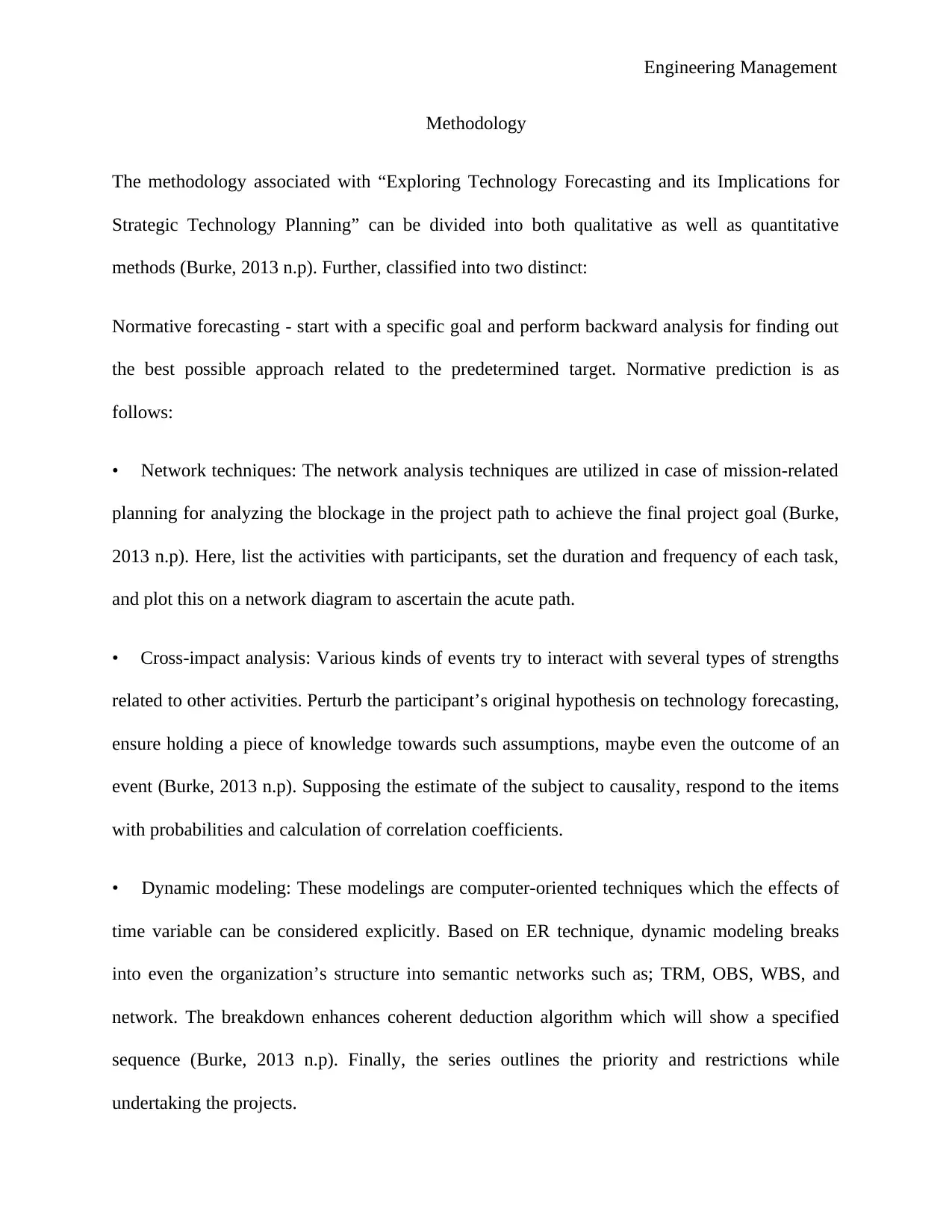
Engineering Management
Methodology
The methodology associated with “Exploring Technology Forecasting and its Implications for
Strategic Technology Planning” can be divided into both qualitative as well as quantitative
methods (Burke, 2013 n.p). Further, classified into two distinct:
Normative forecasting - start with a specific goal and perform backward analysis for finding out
the best possible approach related to the predetermined target. Normative prediction is as
follows:
• Network techniques: The network analysis techniques are utilized in case of mission-related
planning for analyzing the blockage in the project path to achieve the final project goal (Burke,
2013 n.p). Here, list the activities with participants, set the duration and frequency of each task,
and plot this on a network diagram to ascertain the acute path.
• Cross-impact analysis: Various kinds of events try to interact with several types of strengths
related to other activities. Perturb the participant’s original hypothesis on technology forecasting,
ensure holding a piece of knowledge towards such assumptions, maybe even the outcome of an
event (Burke, 2013 n.p). Supposing the estimate of the subject to causality, respond to the items
with probabilities and calculation of correlation coefficients.
• Dynamic modeling: These modelings are computer-oriented techniques which the effects of
time variable can be considered explicitly. Based on ER technique, dynamic modeling breaks
into even the organization’s structure into semantic networks such as; TRM, OBS, WBS, and
network. The breakdown enhances coherent deduction algorithm which will show a specified
sequence (Burke, 2013 n.p). Finally, the series outlines the priority and restrictions while
undertaking the projects.
Methodology
The methodology associated with “Exploring Technology Forecasting and its Implications for
Strategic Technology Planning” can be divided into both qualitative as well as quantitative
methods (Burke, 2013 n.p). Further, classified into two distinct:
Normative forecasting - start with a specific goal and perform backward analysis for finding out
the best possible approach related to the predetermined target. Normative prediction is as
follows:
• Network techniques: The network analysis techniques are utilized in case of mission-related
planning for analyzing the blockage in the project path to achieve the final project goal (Burke,
2013 n.p). Here, list the activities with participants, set the duration and frequency of each task,
and plot this on a network diagram to ascertain the acute path.
• Cross-impact analysis: Various kinds of events try to interact with several types of strengths
related to other activities. Perturb the participant’s original hypothesis on technology forecasting,
ensure holding a piece of knowledge towards such assumptions, maybe even the outcome of an
event (Burke, 2013 n.p). Supposing the estimate of the subject to causality, respond to the items
with probabilities and calculation of correlation coefficients.
• Dynamic modeling: These modelings are computer-oriented techniques which the effects of
time variable can be considered explicitly. Based on ER technique, dynamic modeling breaks
into even the organization’s structure into semantic networks such as; TRM, OBS, WBS, and
network. The breakdown enhances coherent deduction algorithm which will show a specified
sequence (Burke, 2013 n.p). Finally, the series outlines the priority and restrictions while
undertaking the projects.
⊘ This is a preview!⊘
Do you want full access?
Subscribe today to unlock all pages.

Trusted by 1+ million students worldwide
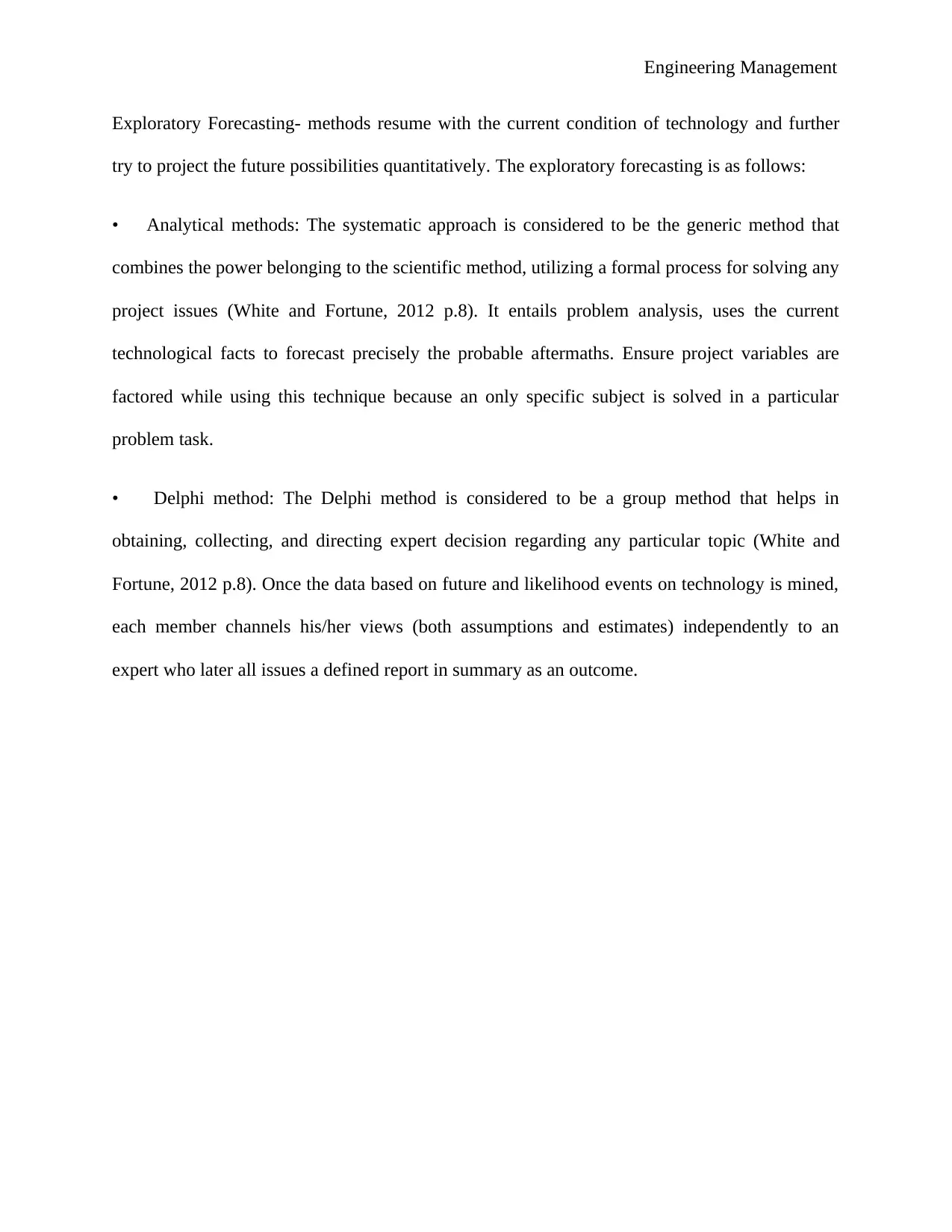
Engineering Management
Exploratory Forecasting- methods resume with the current condition of technology and further
try to project the future possibilities quantitatively. The exploratory forecasting is as follows:
• Analytical methods: The systematic approach is considered to be the generic method that
combines the power belonging to the scientific method, utilizing a formal process for solving any
project issues (White and Fortune, 2012 p.8). It entails problem analysis, uses the current
technological facts to forecast precisely the probable aftermaths. Ensure project variables are
factored while using this technique because an only specific subject is solved in a particular
problem task.
• Delphi method: The Delphi method is considered to be a group method that helps in
obtaining, collecting, and directing expert decision regarding any particular topic (White and
Fortune, 2012 p.8). Once the data based on future and likelihood events on technology is mined,
each member channels his/her views (both assumptions and estimates) independently to an
expert who later all issues a defined report in summary as an outcome.
Exploratory Forecasting- methods resume with the current condition of technology and further
try to project the future possibilities quantitatively. The exploratory forecasting is as follows:
• Analytical methods: The systematic approach is considered to be the generic method that
combines the power belonging to the scientific method, utilizing a formal process for solving any
project issues (White and Fortune, 2012 p.8). It entails problem analysis, uses the current
technological facts to forecast precisely the probable aftermaths. Ensure project variables are
factored while using this technique because an only specific subject is solved in a particular
problem task.
• Delphi method: The Delphi method is considered to be a group method that helps in
obtaining, collecting, and directing expert decision regarding any particular topic (White and
Fortune, 2012 p.8). Once the data based on future and likelihood events on technology is mined,
each member channels his/her views (both assumptions and estimates) independently to an
expert who later all issues a defined report in summary as an outcome.
Paraphrase This Document
Need a fresh take? Get an instant paraphrase of this document with our AI Paraphraser
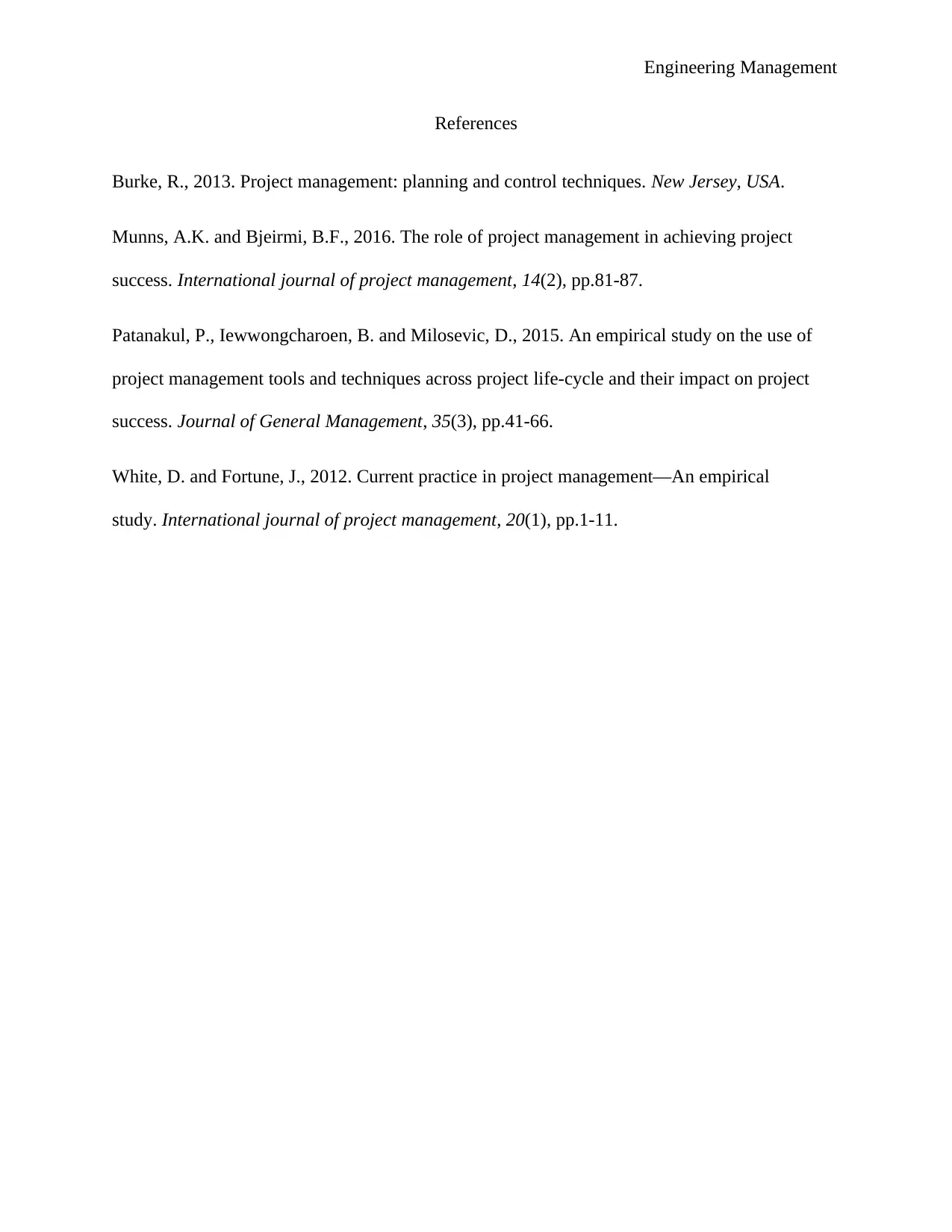
Engineering Management
References
Burke, R., 2013. Project management: planning and control techniques. New Jersey, USA.
Munns, A.K. and Bjeirmi, B.F., 2016. The role of project management in achieving project
success. International journal of project management, 14(2), pp.81-87.
Patanakul, P., Iewwongcharoen, B. and Milosevic, D., 2015. An empirical study on the use of
project management tools and techniques across project life-cycle and their impact on project
success. Journal of General Management, 35(3), pp.41-66.
White, D. and Fortune, J., 2012. Current practice in project management—An empirical
study. International journal of project management, 20(1), pp.1-11.
References
Burke, R., 2013. Project management: planning and control techniques. New Jersey, USA.
Munns, A.K. and Bjeirmi, B.F., 2016. The role of project management in achieving project
success. International journal of project management, 14(2), pp.81-87.
Patanakul, P., Iewwongcharoen, B. and Milosevic, D., 2015. An empirical study on the use of
project management tools and techniques across project life-cycle and their impact on project
success. Journal of General Management, 35(3), pp.41-66.
White, D. and Fortune, J., 2012. Current practice in project management—An empirical
study. International journal of project management, 20(1), pp.1-11.
1 out of 5
Related Documents
Your All-in-One AI-Powered Toolkit for Academic Success.
+13062052269
info@desklib.com
Available 24*7 on WhatsApp / Email
![[object Object]](/_next/static/media/star-bottom.7253800d.svg)
Unlock your academic potential
Copyright © 2020–2026 A2Z Services. All Rights Reserved. Developed and managed by ZUCOL.





